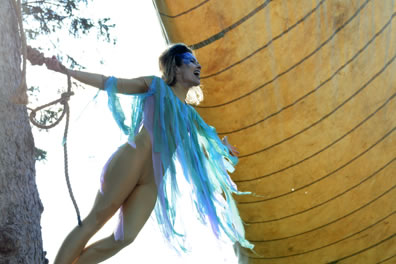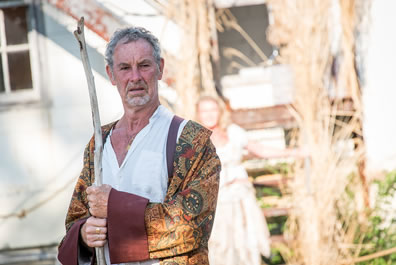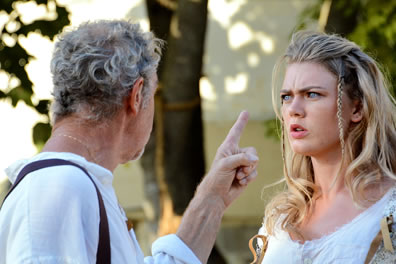The Tempest
The Palpable Presence of the Missing Third
Shakespeare & Company, Roman Garden Theatre, Lenox, Massachusetts
Friday, September 1, 2017, B-64&65 (second row, middle of one side for theater in the rectangle)
Directed by Allyn Burrows

Ariel (Tamara Hickey) calls from a real tree in Shakespeare & Company's production of William Shakespeare's The Tempest at the company's new outdoor Roman Garden Theatre. The theater's environment informed the setting and timing of the Allyn Burrows-helmed production. Photo by Olivia Winslow, Shakespeare & Company.
Ariel flits from tree to tree—real trees. You hear dogs barking and feel the breeze blowing, both on cue. And when Prospero says that "The time 'twixt six and now must by us both be spent most preciously," in that moment in this environment you are sharing something more than William Shakespeare's words with his original audience; you are sharing in their time.
These are among the delights of seeing The Tempest in Shakespeare & Company's new Roman Garden Theatre. Nevertheless, the production's most enticing aspect is how Prospero and his daughter, Miranda, literally gnash at each other like wolves establishing their social order in one moment, and in the next they embrace as if their lives depended on their love. A variety of stages, such as this outdoor theater-in-the-rectangle, can infuse this play about magic with real magic. Inevitably, though, insightful readings by veteran Shakespearean actors following the lead of an intelligent director are what keep Shakespeare's scripts ever-current, ever-evolving, always interesting.
In its 40th anniversary season, Shakespeare & Company unveiled its new play space inside a hedge-bordered garden adjoining one of the original buildings on the former Lenox School for Boys campus that now serves as the company's home. The 280-seat space is the fourth theater on Shakespeare & Company's property.
The Tempest, directed by the company's new artistic director, Allyn Burrows, is a perfect choice for inaugurating the space. Set Designer Jim Youngerman places two amoeba-shaped slabs surrounded by tall beach grasses and cattails inside the seating area, but the play space expands beyond the audience. Ship sails hang high in tree limbs, a fire escape on the building serves as entrance to Prospero's "poor cell," and both Ariel and Miranda climb to perches in the surrounding trees. Sometimes the action happens behind at least one-fourth of the audience, but golden moments abound, too. Prospero points at one of two five-story-high pine trees near the gate to the garden as he reminds Ariel how he found her imprisoned "into a cloven pine"—that very pine, apparently.
In another apt choice, performances start at 5 p.m. The aura of dusk approaching underscores a thematic arc of the play. This timing also carries scholastic resonance. Shakespeare, criticized for ignoring the classical unities in his play, used his final solo composition to adhere to the unities with in-your-face precision as the action of the play occurs in the time of the play, between two and three hours. In Shakespeare's time, theaters performed their plays in the afternoon daylight, perhaps starting at 2 or 3. With the summer sun setting at 8 p.m. or later in London, a play concluding by 6 allows patrons to get home before dark.
This production opens with Ariel (Tamara Hickey in cream-colored body suit and feathery blue shawl) entering to the sound of wind—and a real breeze, too: amazing the scripted yet natural effects you can get in an outdoor theater. Later, as Ariel sings for Ferdinand, we hear dogs barking in the distance—right before Ariel sings how "The watch-dogs bark!" It seems a magical coincidence, except that the original text's stage direction has "Burthen dispersedly" right before Ariel sings that line: amazing the natural effects Sound Designer and Composer Arshan Gailus can get in an outdoor theater.
The theater's location outdoors in western Massachusetts is more than a novelty theater experience for this play, however. Burrows uses it to inform his setting for The Tempest. Shakespeare places his play somewhere in the Mediterranean, as the King of Naples and his court are sailing from Tunisia back to Italy when Prospero shipwrecks them on his island. However, Shakespeare had Bermuda in mind for this mysterious island (e.g., Ariel's "the still-vex'd Bermoothes") as he based elements of The Tempest on reports of a Jamestown expedition's shipwreck and survival on that island. Thus, the island's actual location is subject to artistic imagination, and Burrows, noting those two giant pines adjacent to his new theater, writes in his program notes that "Their presence is more fitting to the topography of the 40th parallel, perhaps an island off Nova Scotia. We therefore ran with that inclination in the design and music of our environment" (and, I must add, the chill of early autumn in New England). With costumes designed by Govane Lohbauer, this production times the action to the 1890s, the end of the Victorian Age, "a time of upheaval, economic volatility, unfettered industrial growth, invention, and uncertainty as reflected through the very characters who find themselves on this small piece of earth in the ocean," Burrows writes. The nobles wear military uniforms, and Trinculo (Bella Merlin, playing a woman) is a cockney-accented music hall entertainer in plaid jacket and pants.
A more important production choice, one that incurs major textual alterations, is limiting the cast to nine. "Nine was a generous number for me, as I'd directed The Tempest with eight actors before, and it makes for some challenging quick changes," Burrows writes in an email. "There are some budgetary advantages to telling these stories with fewer actors, but mainly, it's about showing off certain actors' brilliant abilities to pull off doubling turns that speak to larger issues of status, class, poetry, and relationships." However, only one actor actually doubles in two name roles, Josh Aaron McCabe as Alonso, King of Naples, and as Stephano, the butler—and yes, McCabe manages a couple of amazingly quick changes between King Alonso, the grieving father but still-commanding ruler in medal-festooned, red Army dress uniform, and would-be king Stephano, the drunk butler with schizophrenic tendencies in classic black tie and tails, bowler hat, and white gloves. One is drunk with power, the other is just drunk; one rules a nation, the other a rules a household; one provided the muscle in a usurpation of Prospero as ruler of Milan, the other is supposed to provide the muscle in a usurpation of Prospero as ruler of the island.
A cast playing 10 named parts in a play with 14 named characters plus mariners and spirits means excising some roles. Ariel takes the part of the Boatswain and Captain in the opening scene's tempest as she choreographs the storm and its effects on the Italian nobles (the crew's appearance in the final scene is dropped). Other cast members play the spirits appearing as indigenous beings with lion-like masks (there is report of a "herd of lions" on the island). Minor named characters are excised but, most daringly, so is Gonzalo, the "honest old councilor" whom Prospero credits for providing him his library of books as he was being cast off from Milan.
Burrows stages around the absence of Gonzalo by dropping most of his lines, including his entire utopian commonwealth speech and the counter jokes that accompany it (this and other textual cuts trim the production to two hours plus a 15-minute intermission). Other key Gonzalo passages are given to Prospero's usurping brother, Antonio (Mark Zeisler), including the report that Alonso's son, Ferdinand, may yet live as he saw him "trod the water." In this production, Antonio intercedes when Alonso's brother, Sebastian (Thomas Brazzle), rages against the king for getting them in their current predicament. "My lord Sebastian," says Zeisler's Antonio (rather than the text's Gonzalo), "the truth you speak doth lack some gentleness, and time to speak it in: you rub the sore when you should bring the plaster." Zeisler speaks this with firm logic to the man who, in the next few minutes, he will encourage to assassinate the king. In this combined portrayal, Antonio is no joker but an acutely studious Machiavellian, knowing how and when to flatter the king (and Sebastian, too) and when to strike at opportunity. At play's end, he knows when to concede the Milan dukedom back to Prospero, doing so out of the king's presence (a circumstance of staging the final scene so that Alonso exits before Stephano enters).
Dropping Gonzalo from the play has thematic reverberations, too. Ariel specifically mentions Gonzalo, "his tears run down his beard, like winter's drops from eaves of reeds," when she describes the nobles distracted by Prospero's spells. "If you now beheld them, your affections would become tender," she tells Prospero. With the Gonzalo reference perforce dropped, Prospero (Nigel Gore) doesn't have Ariel's reaction to his own savior to help light his way to redemption. Yet, this moment remains intensely powerful. Gore's Prospero is so caught up in his anger—his fuel for survival—that when he responds to Ariel's entreaty with "Dost thou think so, spirit?" Gore roars the line and physically threatens her with untold horrors at the tip of his staff. But she stands her ground: "Mine would, sir, were I human," she replies. He pauses, realizing—being schooled by Ariel, "which art but air"—how far into the dark side of his humanity he has tumbled. At last, Gore's Prospero says in a tone of frustration, "and mine shall."
Gore's is the most vexed Prospero I've ever seen, constantly pacing like a caged jaguar. He's quick to his volatile temper, which frightens and puzzles Ariel and irritates his daughter, Miranda (Ella Loudon). Driving his bitter personality I suspect is loneliness. When he grants Ferdinand's suit to marry Miranda, Prospero says "I have given you here a third of mine own life, or that for which I live." If Prospero is a third of his "own life," what, or who, is the missing third? Perhaps that piece of virtue, Miranda's mother, he mentions early in the play. The absence of Mrs. Prospero seems to me profoundly prevalent in this production. In Milan, Prospero had been such a duke that the people would never have brooked his murder when Antonio usurped him via Naples' invasion. However, at some point before his downfall, Prospero isolated himself as he sank into his studies, perhaps even becoming addicted to his magic (Gore's delivery of the "ye elves" speech, in which he abjures magic, comes off as a self-intervention). This doesn't sound like a happily married man, but it does fit one shaken by great grief, as the life he had known had, upon his wife's death, dissolved and left "not a rack behind" even before he was exiled and landed on this desert isle with his then-3-year-old daughter.
"Alack, what trouble was I then to you!" she says upon learning the history of his exile, and Loudon speaks this in a tone indicating she knows she's been great trouble to him often since and even now. The foundation of this production is the relationship between Gore's Prospero and Loudon's Miranda. Raised by him (and genuinely thankful for his tutoring her), she is every bit her testy father's daughter—additionally, she is now a hormone-churning teen. Thus, father and daughter constantly swing from great affection to snarling confrontations. When he requests that she "pluck my magic garment from me," she helps take off his robe and then carelessly drops it on the ground. "So, lie there, my art," he says cynically. When Ferdinand (Deaon Griffin-Pressley) first enters, Miranda, standing high on the fire escape, gazes wondrously at him while Prospero at the bottom of the fire escape watches both Ferdinand and Miranda with deep satisfaction. She slowly descends and comes to her father's side, the two leaning their heads against the other's. Yet, when she sticks up for Ferdinand, he hits her with a stun spell, as he had with Ferdinand.


Top, Prospero (Nigel Gore) listens contemplatively as Miranda (Ella Loudon) implores him to save the ship wrecked in the tempest in Shakespeare & Company's production of William Shakespeare's The Tempest staged outdoors in the company's new Roman Garden Theatre. Above, father and daughter get testy with each other, a common occurrance in this production directed by Shakespeare & Company Artistic Director Allyn Burrows. Top photo by Stratton McCrady, bottom photo by Olivia Winslow, Shakespeare & Company.
Gore gives an electric delivery of his "We are such stuff as dreams are made on" speech that interrupts the magic pageant he puts on as a betrothal gift for Miranda and Ferdinand. He describes the end of "the great globe itself" with an aspect of one who sees no worth in living: what's the point of doing all we do if we just die in the end? "Sir, I am vexed," he tells Ferdinand. "Bear with my weakness, my old brain is troubled: Be not disturbed with my infirmity. If you be pleased, retire into my cell and there repose. A turn or two I'll walk to still my beating mind." Gore's Prospero is dealing with an overwhelming vexation and is exhausted in the effort. But Miranda runs across the stage and hugs her father tightly, then kisses his forehead. It's the second electrifying moment in a matter of 20 lines, both connected in their introspective resonance: what is life worth? Love, perhaps.
Loudon plays Miranda with a spirited combination of naive wonder and intellectual and physical strength. She's capable of karate kicking Caliban (Jason Asprey playing the islander "mooncalf monster" with green face, red eyes, hair pulled back in braids and feathers sticking out, claws for hands and feet, and wearing a vest of quilted strands and a buckled belt for a collar). When Ferdinand kisses Miranda's hand, it's Christmas morning for her. However, she physically overpowers Ferdinand, too, as she wrests the logs from him while, at the same time, psychologically overpowering him, saying, "It will become me as it does you." In Griffin-Pressley's performance, Ferdinand not only understands her meaning, it contributes to his growing infatuation with her as a woman who will be his equal. "I, beyond all limit of what else i' the world," he says to her, "do love, [pause] prize, [longer pause] honor you."
In the final scene, Loudon gives a singularly intriguing delivery of Miranda's famous line when she sees the other nobles who have arrived outside her dad's cell. As she notices the duke's chain of office still around Antonio's neck, she realizes who he is. "O brave new world that has such people in't" she says with deep cynicism and spite. Similarly, when Ferdinand talks to his father about "this famous Duke of Milan, of whom so often I have heard renown, but never saw before," Griffin-Pressley aims that last phrase scornfully at Antonio.
Though Prospero did not exact the revenge he intended, this scorn will suffice, as he does get his dukedom back and set his daughter up to become a queen. Yet, Gore plays him as a man more relieved than triumphant. He's ready to sail back to Naples, "where I have hope to see the nuptial of these our dear-belovèd solemnized, and thence retire me to my Milan, where every third thought will be my grave." Miranda's marriage and his retirement: that's two thoughts. A third thought weighs on him still.
Eric Minton
September 13, 2017
Comment: e-mail editorial@shakespeareances.com
Start a discussion in the Bardroom



 Find additional Shakespeareances
Find additional Shakespeareances